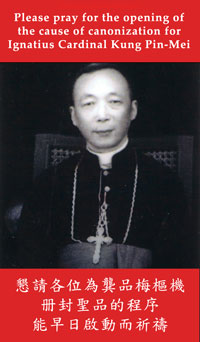Mr. Minter's Reply to My Comments on His Original Article
Keeping Faith on Bishop Jin Luxian
The Atlantic Monthly
September 2007
![]()
![]()
On June 30, Pope Benedict XVI issued his long-awaited letter to China's Catholics. Among other topics, the letter includes a discussion of bishops, including those like Shanghai's Bishop Aloysius Jin Luxian - who was ordained without the pontifical mandate but later were "received into communion with the Successor of Peter." These bishops, the Pope explains, were vetted and granted "full and legitimate exercise of Episcopal jurisdiction." Significantly, the letter's explanatory notes add that these same bishops "were especially concerned with the good of faithful and with an eye to the future."
The contrast between the pope's letter and Joseph Kung's letter is stark. Where the pope is conciliatory, Kung is bitter, going so far as to accuse Jin of stealing the Shanghai diocese and joining "the puppet Catholic Church, now known as the Catholic Patriotic Association." The former point overlooks the fact that Jin's 1985 ordination was attended by two foreign priests with the express knowledge and tacit approval of Pope John Paul II. The later point is factually incorrect (the pope refers to the association as "derived by the State and extraneous to the structure of the Church") and implies that Kung is better able to judge Jin's character that the two popes who have recognized him as the de jure bishop of Shanghai.
Kung's claim that the underground Church has more adherents than the open church has no basis in fact. No reliable census of China's Catholics has been taken since the late 1940s, and as a result, figures on China's Catholic population are notoriously unreliable. Hong Kong's Holy Spirit Study Centre, the preeminent clearinghouse for information on China's Catholics, claims that roughly 12 million Catholics live in China, and pointedly does not list a breakdown between the two Church factions. The simple fact is that nobody knows.
Any researcher who delves into the complicated life of Jin Luxian will confront rumors that he collaborated with the Communist regime after his arrest in 1955. I call them "rumors" because by the mid-1990's, they had been largely discredited - including those propagated by Father Laszlo Ladany in 1987 - as part of the long process whereby Jin was reconciled with the Vatican and the Jesuits. Kung repeats the allegation that Jin, as a reward for his collaboration, lived as a pampered translator during his prison sentence. Jin did, in fact, work as a translator for Baoding's Public Security Bureau, but only after spending 18 years in prisons and reeducation camps. Even during the post-sentence period, Jin remained in government custody - hardly a situation that could be characterized as a reward for collaboration.
There is little question that Cardinal Kung suffered greatly for his faith, and that faith was rightfully recognized by the Pope in 1979 and 1991. But there is also little question that the foundation that bears Kung's name has long been out of touch with the conciliatory tone that Pope John Paul II began to cultivate in the early '80s, and which Pope Benedict XVI's letter has codified.
Adam Minter's reply (September 07, 2007 of The Atlantic Monthly) to my comments on his original article is cleverly written. However, the cleverness is a smokescreen for his lack of substance. When he says that Jin's episcopal ordination was attended by two foreign priests, he is referring to the fact that two of his priest friends (probably of Maryknoll, well known as his supporter) attended the ordination. They did not represent the Vatican. If they had, the Vatican would have announced it. However, the Vatican did not do so. They were just ordinary observers like hundreds of others present at that time. Minter's claim that the ordination had Pope John Paul II's "tacit approval" is patently false. Jin would have been in communion with Rome if he had Pope John Paul II's "tacit approval" from the time of his episcopal ordination, but that is clearly not the case. Otherwise, Jin would NOT have had to be later received into communion with Rome. Incidentally, Jin has yet to make a public profession of faith as required by Pope Benedict for full communion with Rome, as clearly written in the Pope's China letter published on June 30, 2007.
Minter's accusing me of being "bitter" is a crucial part of his smokescreen reply and a sure give-away of his lack of substance. When Minter lacks a substantial reply he attacks the person whom he cannot refute. For example, he attempts to contrast my description of the Patriotic Association ("the puppet Catholic Church") with Pope Benedict's ("desired by the State and extraneous to the structure of the Church.") While the wording of each is different from the other, the two descriptions are essentially the same. As a matter of fact, one of Pope Benedict's most important points in his letter is to have clearly indicated that the Patriotic Association, as "extraneous to the structure of the Church," is at best theologically irrelevant to the equation of Patriotic bishops coming into full communion with Rome, and at worst a theological impediment to that full communion. In other words, Pope Benedict wisely chose to deal with each individual bishop rather than with the Patriotic Church as a whole, "extraneous to the structure of the Church" as it is.
Minter's claim that two popes have recognized Jin as the de jure bishop of Shanghai does not erase the fact that Jin violated episcopal communion - with his own bishop, then Bishop Kung, and with the Pope - when he stole the Shanghai diocese from my uncle, Cardinal Kung, while he was still alive and while he was not retired. {In my original rebuttal text, I did not write "Kung was not yet retired." I wrote "Kung was not retired." The word "yet" was erroneously added by the editor of the Atlantic Monthly magazine.}
Kung in fact never retired in his life time. On page 59 and 715 of the official Vatican publication Annuario Pontificio 2000, Cardinal Kung was listed as "Vescovo di Shanghai" (Bishop of Shanghai). 2000 denotes the year of publication. The year 2000 was also the year when Cardinal Kung died. Jin's name was not even mentioned anywhere in this official Vatican publication. These are facts that Minter's smokescreen cannot make go away. Minter's attempt to dismiss these facts by accusing me of being "bitter" will not wash. His dismissal is simply part of his smokescreen.
Minter's dismissal of the population figures for the underground Roman Catholic Church and for the Patriotic Association - ten million and four million, respectively, - will not disappear simply because Minter does not like them. Any informed and competent writer on the Catholic Church in China will not question these figures because they are so well known and established. These figures are based on reliable and widely respected sources. In its news report on June 6, 2005, for instance, Asia News which is based in Rome, Italy, wrote: "…At least 8 million people in China refer to the underground Church. According to government figures, 4 million Catholics belong to the official Church..."
Minter's description of Jin's cooperation with the communist Chinese government and the Patriotic Association as "rumors" is another betrayal of his own smokescreen, his total ignorance and naiveté. They don't become rumors simply because Minter labels them as such. Nor is the report of Father Lazlo Ladany discredited simply because Minter wants it so. By what evidence does Minter dare to say that the report of Father Lazlo Ladany has been discredited? Minter is no Father Ladany.
As a matter of fact, I have close relatives and friends who witnessed Jin's cooperation with the communist Chinese government and the Patriotic Association. At the time of Jin's cooperation, these relatives and friends were in the same jail as Jin. They were given a tape recording of Jin urging them to join the Patriotic Association. I also know the family that was a victim of Jin's cooperation with the communist Chinese government and the Patriotic Association.
Minter's claim that Jin worked as a translator for Baoding's Public Security Bureau only AFTER serving eighteen years in prison is patently false. Jin served as a translator both during and after his prison time. Minter foolishly expects his readers to believe that the communist Chinese government would employ an imprisoned priest to serve on its Public Security Bureau before that priest betrayed the Roman Catholic Church and caved in to the Patriotic Association. Would anyone believe that the communists could have employed ANYONE to work in their top-secret Public Security Bureau if that person were not trustworthy to the communists and if that person had not done some special favor to the Chinese communist government? For example, as I stated in my original rebuttal to Minter, "several families suffered because of his confessions."
The final betrayal of his own smokescreen comes when he claims that the Cardinal Kung Foundation is out of touch with the conciliatory tone of Pope John Paul II and Pope Benedict XVI. Minter wants his readers to think that for these two Popes there are no significant differences in principle between the Roman Catholic Church and the Patriotic Association. Like the Chinese government, Minter censors Pope Benedict's letter to Catholics in China.
For example, Minter would not like his readers to be reminded of Pope Benedict's non-conciliatory statement about the Patriotic Association (the statement by which the Pope rendered the Patriotic Association theologically irrelevant at best and a theological impediment at worst): "Communion and unity - let me repeat... are essential and integral elements of the Catholic Church: therefore the proposal for a Church that is 'independent' of the Holy See, in the religious sphere, is incompatible with Catholic doctrine." (Section 8 of Pope Benedict XVI's letter to Chinese Catholic faithful)
Undoubtedly, Minter would wince if his readers were reminded of two statements by Pope John Paul II: one in January 1995, in which Pope John Paul wrote that "a Catholic who wishes to remain such and to be recognized as such cannot reject the principle of communion with the Successor of Peter;" and the other in December 1996, in which the Pope wrote that "[a]ll Chinese Catholics are called to remain loyal to the faith received and passed on, and not to yield to models of a Church which do not correspond to the will of the Lord Jesus, to the Catholic faith, or the feelings and convictions of the great majority of Chinese Catholics."
While working and praying for genuine ecclesial unity in China, the Cardinal Kung Foundation does not allow the smokescreen and deceptions of Adam Minter to compromise the truth.
Joseph Kung
President
Cardinal Kung Foundation




